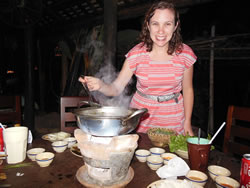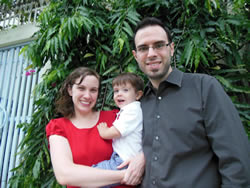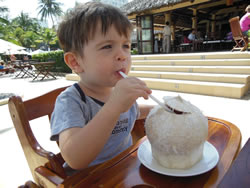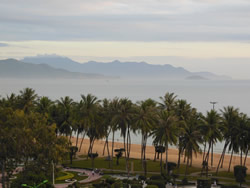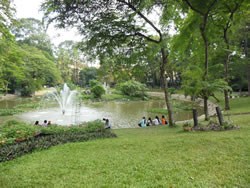- Home » Expat Articles » Interviews » American Expat Living in Vietnam - Interview With Heather
American Expat Living in Vietnam - Interview With Heather
| Published: | 4 Feb at 9 AM |
Want to get involved?
Become a Featured Expat and take our interview.
Become a Local Expert and contribute articles.
Get in touch today!
Become a Local Expert and contribute articles.
Get in touch today!
Filed: Interviews,Viet Nam
Heather Carreiro is an international teacher and writer currently living in Vietnam. She has been lost on a volcano in the Azores, stuffed into Moroccan grand taxiswith 6 other passengers and goats in the trunk, and crossed a landslide on Pakistan's Karakoram Highway. Her family’s latest international move, with a toddler in tow, has started a whole new phase in her expat experience. While in Lahore she enjoyed going out to find textiles for tailor-made shalwar-kameez, she now feels accomplished when she has found toddler-sized bicycle helmets and BPA-free sippy cups in Saigon. Heather's expat blog is called Expat Heather (see listing here)
Where are you originally from?
I’m from western Massachusetts and my husband, Duarte, is from the Azores, a Portuguese archipelago in the mid-Atlantic.
In which country and city are you living now?
Ho Chi Minh City, Vietnam
Why did you move and what do you do?
My husband and I are both international teachers, and we were offered positions at ISHCMC American Academy. The school is for students in grades 6-12 and is located in a suburb of Ho Chi Minh City.
I teach English Language Arts, and my husband teaches secondary Mathematics up to Calculus. This past summer, I attended a two-week training at Syracuse University to become an adjunct instructor of the English and Writing departments. At American Academy in Vietnam, I’m now able to teach two Syracuse University courses for college credit.
While these types of concurrent enrollment programs are common in the U.S., it’s pretty new to international teaching. Being able to be part the Syracuse University Project Advance (SUPA) program is part of the reason I ended up taking this job in Ho Chi Minh City.
How long have you lived here and how long are you planning to stay?
We’ve been here since July 2012, and we hope to stay for a while. We have a two-year-old son, and Southeast Asia is a wonderful place to have young children. There is a lot for kids to do, and we have two amazing ladies who work in our house and take care of all the cooking, grocery shopping, cleaning, laundry and daytime childcare.
It would be quite difficult, after getting used to this lifestyle, to go back to a country where we had to take care of all the household work and cooking ourselves! Employing a nanny and a maid allows us to spend a lot more quality time together as a family, and it definitely takes off a lot of the stress typically faced by working moms.
How did you find the transition to living in Vietnam?
I’ve previously spent three years in Lahore, Pakistan and one year in Morocco, so making the transition wasn’t too difficult. This time around though, it was our first time moving abroad with a child, so we had different things to focus on.
Our priorities for the big move were: 1) finding a reliable nanny, 2) finding a house to rent ASAP as our active toddler does not do well in small apartments and 3) finding a nursery school for our son. When it came to packing for our shipping allowance, most of the stuff we shipped was for him!
This was so different from when we moved to Pakistan and our priorities were sightseeing, meeting people, and learning language. I spoke Urdu well enough to have conversations with random people on buses, haggle over prices and communicate with rickshaw drivers, so to come to Vietnam and not speak any Vietnamese was difficult. Still, every time I get in a taxi I start thinking in Urdu.
How would you compare this move to moving to Pakistan? Was it easy making friends and meeting Vietnamese people, or do you mainly socialise with other expats?
In Pakistan, we probably knew about 10 expats total. Many of our friends were Pakistani, and we were fairly immersed in the local culture. I wore Pakistani clothes and spoke Urdu most of the time in public, but while this type of cultural immersion is the best way to learn about your host country and its people, it takes a lot of time, effort and cultural misunderstandings to get there.
Moving to Vietnam to work in a school where we are designing the curriculum from scratch and taking care of a toddler, we knew we wouldn’t have much time initially to learn the language or meet a lot of new people.
Our first six months, we’ve focused on spending time together as a family, getting settled and preparing educational materials for our new teaching jobs. Right now, we mostly hang out with other expats.
How does the cost of living compare to home?
You generally get more value for your money in Vietnam than in the U.S. Full-time childcare is a lot more affordable.
For example, in the U.S. it cost me about $1000 per month for full-time day care. During my two-week training at Syracuse University, I hired a local college student as a nanny. It cost me $400 per week.
In Vietnam, for less than $1000 per month we pay for our son’s school tuition (3 mornings per week), a full-time nanny and cook, a full-time maid and a part-time gardener.
Eating out or ordering food is generally cheaper, and fresh fruits and vegetables are less expensive than in the U.S. as well. We love getting fresh baguettes every day for a fraction of what it would cost to get in New England.
Travel and accommodation within the region is also inexpensive, so we can afford to take more vacations.
What are the best things to do in the area; anything to recommend to future expats?
With young kids, one of the best places to hang out in District 2 is Snap Cafe. The shaded, sandy playground can keep kids busy for hours, and it’s a good place to meet other families.
What do you enjoy most about living here?
The low cost of living, the food scene, and tropical weather in December – I don’t miss shoveling snow!
What negatives, if any, are there to living here?
The city doesn’t have a good public transportation system that connects the city center to other areas, such as the MRT in Singapore or Bangkok’s water taxis. Most expats have motorbikes, but with a toddler who would jump off at speed and the highly polluted urban air, we prefer to take taxis if we go into the city.
Much of the gasoline used is still leaded, so there are high levels of lead in heavy traffic areas that can cause lead poisoning in young children. Several nice parks for children are in the city center, but since they are in heavy traffic areas with a lot of pollution we don’t bring our son there.
The traffic is also difficult to navigate if you’re not used to driving with thousands of motorbikes, and rush hour traffic moves pretty slowly. Due to import taxes, cars are very expensive.
If you could pick one piece of advice to anyone moving here, what would it be?
Ship or pack anything you think you’ll want from home. The postal service is pretty expensive, and you’ll also need to pay a high customs tax on anything you receive. Before shipping, be sure to talk to your shipping company about what types of taxes you may need to pay when your shipment arrives.
What are your top 5 expat tips for anyone who wants to teach in Ho Chi Minh City?
Tell us a bit about your own expat blog.
I write mostly informative articles about travel, teaching and living abroad. The majority of my location-specific content is about Pakistan, and you can access a directory of all my Pakistan articles at http://expatheather.com/pakistan.
I also have a large collection of ESL & English teaching resources and lesson plans here: http://expatheather.com/esl/
Finally, I have my “expat mom blog” where I focus on parenting, natural and chemical-free baby products, and personal updates (aka cute pictures of our son on his world travels). Read more here: http://parenting.expatheather.com
How can you be contacted for further advice to future expats coming to your area?
You can reach me at my blog or via twitter @expatheather.
Heather blogs at http://expatheather.com/ which we recommend a quick visit if you haven't been already. Expat Heather has an ExpatsBlog.com listing here so add a review if you like! If you appreciated this interview with Heather, please also drop her a quick comment below.
Here's the interview with Heather...
Where are you originally from?
I’m from western Massachusetts and my husband, Duarte, is from the Azores, a Portuguese archipelago in the mid-Atlantic.
In which country and city are you living now?
Ho Chi Minh City, Vietnam
Why did you move and what do you do?
My husband and I are both international teachers, and we were offered positions at ISHCMC American Academy. The school is for students in grades 6-12 and is located in a suburb of Ho Chi Minh City.
I teach English Language Arts, and my husband teaches secondary Mathematics up to Calculus. This past summer, I attended a two-week training at Syracuse University to become an adjunct instructor of the English and Writing departments. At American Academy in Vietnam, I’m now able to teach two Syracuse University courses for college credit.
While these types of concurrent enrollment programs are common in the U.S., it’s pretty new to international teaching. Being able to be part the Syracuse University Project Advance (SUPA) program is part of the reason I ended up taking this job in Ho Chi Minh City.
How long have you lived here and how long are you planning to stay?
We’ve been here since July 2012, and we hope to stay for a while. We have a two-year-old son, and Southeast Asia is a wonderful place to have young children. There is a lot for kids to do, and we have two amazing ladies who work in our house and take care of all the cooking, grocery shopping, cleaning, laundry and daytime childcare.
It would be quite difficult, after getting used to this lifestyle, to go back to a country where we had to take care of all the household work and cooking ourselves! Employing a nanny and a maid allows us to spend a lot more quality time together as a family, and it definitely takes off a lot of the stress typically faced by working moms.
How did you find the transition to living in Vietnam?
I’ve previously spent three years in Lahore, Pakistan and one year in Morocco, so making the transition wasn’t too difficult. This time around though, it was our first time moving abroad with a child, so we had different things to focus on.
Our priorities for the big move were: 1) finding a reliable nanny, 2) finding a house to rent ASAP as our active toddler does not do well in small apartments and 3) finding a nursery school for our son. When it came to packing for our shipping allowance, most of the stuff we shipped was for him!
This was so different from when we moved to Pakistan and our priorities were sightseeing, meeting people, and learning language. I spoke Urdu well enough to have conversations with random people on buses, haggle over prices and communicate with rickshaw drivers, so to come to Vietnam and not speak any Vietnamese was difficult. Still, every time I get in a taxi I start thinking in Urdu.
How would you compare this move to moving to Pakistan? Was it easy making friends and meeting Vietnamese people, or do you mainly socialise with other expats?
In Pakistan, we probably knew about 10 expats total. Many of our friends were Pakistani, and we were fairly immersed in the local culture. I wore Pakistani clothes and spoke Urdu most of the time in public, but while this type of cultural immersion is the best way to learn about your host country and its people, it takes a lot of time, effort and cultural misunderstandings to get there.
Moving to Vietnam to work in a school where we are designing the curriculum from scratch and taking care of a toddler, we knew we wouldn’t have much time initially to learn the language or meet a lot of new people.
Our first six months, we’ve focused on spending time together as a family, getting settled and preparing educational materials for our new teaching jobs. Right now, we mostly hang out with other expats.
How does the cost of living compare to home?
You generally get more value for your money in Vietnam than in the U.S. Full-time childcare is a lot more affordable.
For example, in the U.S. it cost me about $1000 per month for full-time day care. During my two-week training at Syracuse University, I hired a local college student as a nanny. It cost me $400 per week.
In Vietnam, for less than $1000 per month we pay for our son’s school tuition (3 mornings per week), a full-time nanny and cook, a full-time maid and a part-time gardener.
Eating out or ordering food is generally cheaper, and fresh fruits and vegetables are less expensive than in the U.S. as well. We love getting fresh baguettes every day for a fraction of what it would cost to get in New England.
Travel and accommodation within the region is also inexpensive, so we can afford to take more vacations.
What are the best things to do in the area; anything to recommend to future expats?
With young kids, one of the best places to hang out in District 2 is Snap Cafe. The shaded, sandy playground can keep kids busy for hours, and it’s a good place to meet other families.
What do you enjoy most about living here?
The low cost of living, the food scene, and tropical weather in December – I don’t miss shoveling snow!
What negatives, if any, are there to living here?
The city doesn’t have a good public transportation system that connects the city center to other areas, such as the MRT in Singapore or Bangkok’s water taxis. Most expats have motorbikes, but with a toddler who would jump off at speed and the highly polluted urban air, we prefer to take taxis if we go into the city.
Much of the gasoline used is still leaded, so there are high levels of lead in heavy traffic areas that can cause lead poisoning in young children. Several nice parks for children are in the city center, but since they are in heavy traffic areas with a lot of pollution we don’t bring our son there.
The traffic is also difficult to navigate if you’re not used to driving with thousands of motorbikes, and rush hour traffic moves pretty slowly. Due to import taxes, cars are very expensive.
If you could pick one piece of advice to anyone moving here, what would it be?
Ship or pack anything you think you’ll want from home. The postal service is pretty expensive, and you’ll also need to pay a high customs tax on anything you receive. Before shipping, be sure to talk to your shipping company about what types of taxes you may need to pay when your shipment arrives.
What are your top 5 expat tips for anyone who wants to teach in Ho Chi Minh City?
- Get a teaching certification – you’ll need one for the visa application process.
- Talk with current teachers at your intended school before accepting a position.
- Get your motorbike license before arrival so it can easily be converted into a Vietnamese driving license.
- Get a good idea about where your school is located and what the neighborhood is like, as Ho Chi Minh City is a sprawling area with many different types of living environments.
- Start your work visa paperwork early! It can take several months to get all of your documents ready, especially if you are not living in your home country.
Tell us a bit about your own expat blog.
I write mostly informative articles about travel, teaching and living abroad. The majority of my location-specific content is about Pakistan, and you can access a directory of all my Pakistan articles at http://expatheather.com/pakistan.
I also have a large collection of ESL & English teaching resources and lesson plans here: http://expatheather.com/esl/
Finally, I have my “expat mom blog” where I focus on parenting, natural and chemical-free baby products, and personal updates (aka cute pictures of our son on his world travels). Read more here: http://parenting.expatheather.com
How can you be contacted for further advice to future expats coming to your area?
You can reach me at my blog or via twitter @expatheather.
Heather blogs at http://expatheather.com/ which we recommend a quick visit if you haven't been already. Expat Heather has an ExpatsBlog.com listing here so add a review if you like! If you appreciated this interview with Heather, please also drop her a quick comment below.
Grab a featured expat badge that links to this interview!
 Copy and paste code to display the Featured Expat Badge:
Copy and paste code to display the Featured Expat Badge:Comments » There is 1 comment

Lucas Jans wrote 12
years ago:
I wonder what source Heather is citing when she says Vietnam still sells leaded gasoline. The dangers of leaded gasoline are well known, especially to children. According to the World Bank, Vietnam switched to unleaded 14 years ago. http://documents.worldbank.org/curated/en/2002/08/2117742/overnight-sucess-vietnams-switch-unleaded-gasoline
